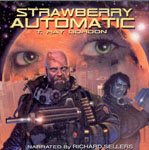
 Red Mars
Red Mars
By Kim Stanley Robinson, read by Richard Ferrone
17 cassettes / 24 hours [UNABRIDGED]
Publisher: Recorded Books
Published: 2000
ISBN: 0788740849
Themes: / Science Fiction / Hard SF / Future history / Mars / Space exploration / Space flight / Planetary colonization / Terraforming
If I were to play you the prolog from Red Mars, neither telling you the title nor showing you the case (with Olympus Mons shown actual size), you would know immediately that it came from a very large book. The mystical meditation on the red planet that opens this tome plumbs the depths of human history and the width of human culture, conjuring a sense of vast space for the story that follows.
And what follows is a massive dose of exhilarating hard science fiction, the first volume in an epic trilogy charting the future history of the colonization of Mars. It grabs us with an opening sequence of mid-novel action, then backs up to lead us more meticulously from the selection of the first one hundred explorer/settlers to their first attempts at independence from the faltering socioeconomic powers of Earth nearly twenty Martian years later. Told through the eyes of half a dozen of these “First Hundred”, the novel details the technical, political, and to some extent personal growth of the colonists through their training on Earth’s Antarctica, the long space voyage between the planets, the rise of the first settlements and buildings, the initial attempts at terraforming, the breakaway of some of the settlers to another colony, the arrival of the next, larger and more diverse waves of colonization, and on to a cataclysmic finale. The story covers a lot of ground with striking believability.
The strongest point of the novel is its marvelous set-pieces, such as the radiation storm scene on the voyage out, a nearly deadly encounter with a Martian dust storm in a dirigible, and a perilous escape down a canyon system that is being destroyed by a torrential flood. Some of the best would be slight plot spoilers to mention, so I won’t. But suffice it to say they are all lovingly crafted, filled with mental eye-popping detail, and yet integrated well into the plot. This is science fiction with its fundamental sense of wonder not only intact, but bursting from every page like an alien from the abdomen. As you might expect, some of this detail and the buildup to monumental scenes leaves a few slow parts in the narrative, but the payoffs are almost always phenomenal.
Also strong is the fundamental clash of old and new economic systems, which contrast idealized concepts of human worth with the dehumanizing iniquities of our international market economy pushed to its all-too-readily conceivable limits. I tend to cheer at any work that is not afraid to point out how the cancerous growth of international corporations in our modern world devours the planet’s resources yet returns nothing of value to the overall system. This book gave me a lot of alternative ideas to dream about, and some Darth Vader-sized economic evil to hiss at cathartically.
One thing I didn’t like was the huge number of fundamental breakthroughs that are made by the “First Hundred” in various fields of science after they leave the messiness of life on earth. That premise borrows a little too much from Frederick Pohl’s Jem, for one thing. For another, as someone who does science and engineering for a living, I don’t believe that if you separate a bunch of scientists and engineers from the mundane glop of real life, you suddenly end up with astounding technical breakthroughs. If it were that easy, you could get any amazing breakthrough you wanted just by throwing a bunch of scientists and engineers in a nice padded cell.
Also, as with most hard science fiction, you could quibble that the characters lack the depth of believable human beings, and that the necessities of the plot move the characters more than their individual natures and decisions determine the plot. But you shouldn’t be reading this book for the same reasons you’d read The Heart is a Lonely Hunter. Come on! Red Mars may do little to illuminate the unrequited yearnings of the human soul, but that’s not the point. It boils over with effervescent ideas, dynamic images, and inspiring speculation on what human minds and hands can achieve. The characters here may feel a little hollow, and their individual voices may be pretty much interchangeable, but they do their job: they lead us into an exciting, vibrant, thrilling future world.
I will admit that the weaknesses in characterization are not greatly aided by Richard Ferrone’s narration. Don’t get me wrong, I found his cigarette-charred, “In a world where…” voice (somewhat reminiscent of my grade school secretary Mrs. Byrd) to be reliably intriguing. And he can spit out the ten-dollar words and knotty concepts in the exposition with lucid authority. However, his voice characterizations are often indistinguishable. It is possible to find yourself confused about who is speaking when the dialog comes without tag lines. This is partly Robinson’s fault for failing to provide distinctive speech patterns for all the characters, but that’s exactly where the voice of the narrator is supposed to help most. For several characters, it does. But for many, it does not.
I consider the above detractions to be minor points, however. Overall, you will find so much to gasp at, delivered with such powerful enthusiasm by both the author and the narrator, that it would be a crime to miss it. I owe a significant fine just for pushing Red Mars down my reading list for so long. If you’re looking for a hard SF novel that will make you sit up and say “Wow!” out loud, then you should get your hands on this one immediately.
Posted by Kurt Dietz

 Strawberry Automatic
Strawberry Automatic
 Red Mars
Red Mars